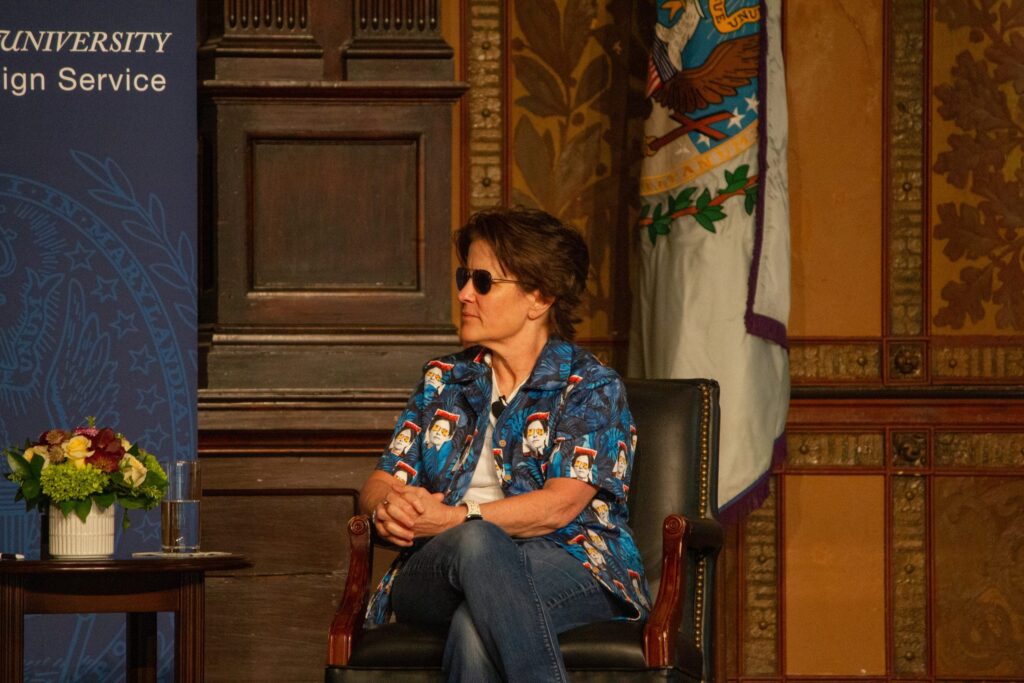On March 14, longtime technology journalist and alumnus Kara Swisher (SFS'84) returned to Georgetown to talk with AOL co-founder Steve Case about her new memoir, “Burn Book: A Tech Love Story.” We had a conversation.

This book traces the 30 years she spent covering technology. washington post, wall street journal, new york times, new york magazine and the technology news site she co-founded with Walt Mossberg. recode. She currently hosts the podcast “On with Kara Swisher” and co-hosts the podcast “Pivot” with New York University professor Scott Galloway. new york magazine.
Throughout his career, Swisher has interviewed major movers and shakers in the technology industry, including Steve Jobs, Elon Musk, and Mark Zuckerberg. In her talk, she shared her anecdotes from working with these people, and she argued that the enormous power of technology should not be in the hands of a few. .
“I think that's what I'm worried about. The data is ours, we pay for the internet, they're benefiting from it, and yet they can do whatever they want. Is it going to be like this?’ And, let me tell you, I know all of these people and I don’t want them to make the decisions,” Swisher said. “We have to, in a sense, take that control back from them, and I'm afraid that's not the case.”

Swisher began his career as a journalist as an undergraduate at Georgetown University, where he served as a features writer. The Hoya and contributors washington post. While working at post, Swisher was assigned to cover AOL, where she met Case and introduced her to the world of technology, which became her field of expertise. Swisher's first two books, AOL.com and There Must Be a Pony in Here Somewhere, chronicle the rise and fall of AOL. During the conversation, Swisher emphasized the importance of AOL's rise.
“I see media companies really struggling with what to do.” [with digital].I always felt you [AOL] was a media company and offered things like that, but they were in the dark about community and continued access,” Swisher said. “Nobody had done that.”
In the tech industry's explosive early days, a certain optimism quickly gave way to dismay as it became clear that the tech industry's leading companies acted without consequences and reaped huge profits. Swisher explains. This change inspired Swisher's book, which begins as a “love story” and ends on a decidedly more pessimistic note.

“When they see the commonality, the potential to bring people together, the potential to find talent everywhere, and they [tech company leaders] It was frustrating because they just wanted to sell ads and take all the data, and they didn't care about the impact of what they were doing,” Swisher said. “And when you realize that these were the richest people in the world with unaccountable power, that's a recipe for disaster, as you're seeing now.”
Even if private technology companies aren't run by bad guys, Swisher believes the unchecked power they have over their users is a big concern. She shared stories of clashes with technology stakeholders over her outspoken approach in advocating for regulation. She recalled that she received a call from Google executives after criticizing the company's move to acquire Yahoo's search engine. Standing her ground, she warned that technology controlled by a single attacker, regardless of its intentions, can have dire consequences. It's a lesson that still sticks with her.
Mr. Swisher assessed the current state of the technology world today and highlighted the negative implications for both domestic and foreign policy of not regulating technology. Misinformation and conspiracy theories are rampant in the United States on social media sites like Facebook and X, while hostile foreign powers are exploiting the lack of control over these platforms to influence American politics. He said there are.A look back at recent legislation Restrict TikTok passed by the House of RepresentativesSwisher encouraged lawmakers to continue considering the national security implications of leaving technology unregulated.
“I feel like this is an opportunity to finally regulate the internet without thinking of it as a dirty word,” she said.

Swisher also answered students' questions, including the changing landscape of journalism in the age of technology and the potential benefits of policies such as the European Union's regulation of artificial intelligence to create a healthier digital space.
Ultimately, Swisher is cautiously optimistic about the growing interest in technology regulation, especially after traveling the country on a book tour.
“I think there's a real movement in this country that's concerned about the power of technology over people's lives and is trying to take technology back from people. I feel really strongly about it, but I don't think it's until we get outside. I wasn’t feeling it,” she said. “I think parents are worried, and I think people who believe in civil rights are worried, too. They know what's going on, but the need to be online and these We understand how important technology is. So I have to say that's very encouraging, very encouraging.”


